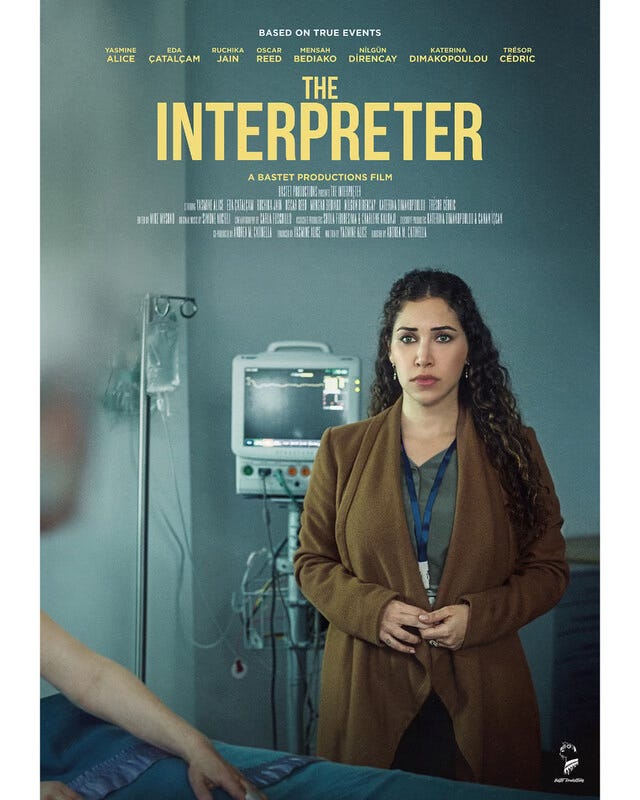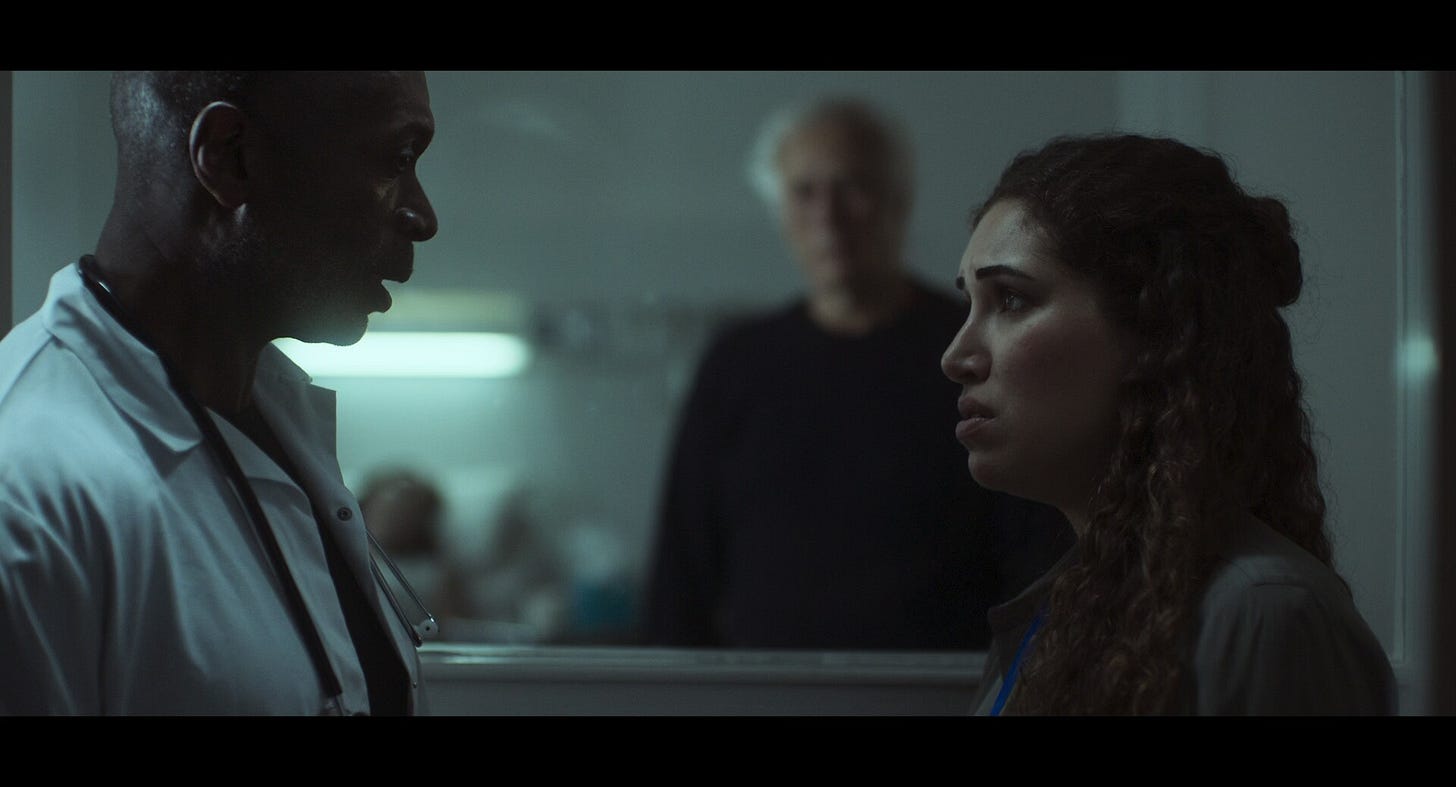Part 35 - 'The Interpreter' - A Gritty Brush With The Languages Of Trauma And Love
Why short films like 'The Interpreter' are so necessary in our society today
It has now been many weeks since I last returned to the blank Substack canvas. I cannot tell you how welcoming the clicking of my keyboard sounds, how easily my fingers traverse the awaiting letters. My life has seemed to expand at an alarming rate over the last few weeks and I was thus forced to step back from my work. I was so eager to return to my journey once more and to return to each one of you, but fate had scattered my deal of cards. But, as I have attempted to regather them, my TV screen has never flickered off. I have consumed film upon film, ranging from the wonders of Sofia Coppola to the animated mishaps of Scooby Doo. Although now is not the time to divulge in all of this, I promise it will come soon. With my 20th birthday and my blog’s 1st anniversary looming, an over-flowing box of surprises is in store for you. So, lovely reader, please expect a longer read in your inbox in the coming weeks.
In the meantime, I would like to make this post in honour of the recently passed International Women’s Day. To celebrate this, I am delighted to touch on the works of writer and producer Yasmine Alice. I am fortunate enough to be part of the Women In Film community; this is a space where women working in the industry can share support, job opportunities and general advice. It has been a brilliant place to occupy, as I was warmly welcomed by dedicated and inspirational women. In an industry that is so male-dominated, it is rewarding to carve out our markings piece by piece. This is where Yas and I first came into contact and subsequently, where I became aware of her short film.
As the BellaWatchesFilm journey has yet to touch on shorter films, I was eager to view The Interpreter. I have come to realise through this experience just how exciting short films can be. They are tiny morsels of extravagant creativity. To see a director or writer’s earliest visions for their work is immensely thrilling, especially at their birth. I felt privileged, getting to witness the fruitful seeds of inspiration being sown. And, with a myriad of potent meanings at its helm, The Interpreter is awash with marvellous potential.

The Interpreter (2024), directed by Andrea M. Catinella, stars Yasmine Alice as Belma, a Turkish interpreter for the NHS. In the throes of a breakup, she is forced to go to a hospital to meet two patients. The first is a woman with severe schizophrenia, Kamelya (played by Eda Çatalcam). Dr Aashvi (Rushika Jain), Kamelya’s supervising doctor, seems jaded and irritable at their meeting. After harrowing consequences ensue, Belma is rushed to her next appointment. Here, she meets Melahat (Nilgün Direncay), a deeply sick woman with Alzheimers. Belma must interpret for Melahat’s husband Ahmet (Oscar Reed) and she is forced to deliver unbearable news. Melahat’s doctor Dr Kofi (Mensah Bediako) seems fatigued and buried deep by the weights of his patient’s struggles. How will Belma cope with the onslaught of disturbing experiences, coupled with her personal issues?
Rooted in real-life experiences, The Interpreter is jarringly raw, and as honest as a diary entry. It is practically ghostly, as we drift from ward to ward to stare at the lost eyes of numbered patients. Every cinematographic touch is executed with a detailed hand; it is engineered to hollow deep into your bones. The sea-sickened greens, the melancholy blues and the granite greys allow the harshness of The Interpreter’s reality to swallow you whole. This is accentuated by the direction of Catinella, who seeks to place us firmly within Belma’s shoes. He creates a clear divide between the first and second patient, with the uses of the Dutch Angle and close-ups. The first, highlights the almost surreal struggle of a doctor’s daily life. The second, positioning us in the fore-front of love’s battle against Alzheimer’s. Although two distinct flavours are presented, they harmonise to remind us of universal suffering.
Alice’s writing creates an inescapably intense atmosphere for the viewer, but it is dialled back to provide emotional charges at the right times. For instance, Kamelya’s dialogue is profanity-infused and full of venom. It highlights the trauma Belma’s capacity to cope with her environment and the reality of Kamelya’s condition. This later develops into desperate emotion that rings true to the state of Britain’s healthcare. Dr Kofi’s line ‘trust me, I need support’ hits with a resounding thud against your chest. Alice doesn’t want to leave any space for the viewer; she is forcing you to confront an experience she has lived. Coupled with the soundtrack’s solitary piano notes, a portrait of candid suffering is created.

Flooded with message upon message, The Interpreter stands tall as a beacon of defiance. With over 300,000 Turkish speakers in Greater London alone, the film depicts a rarely-acknowledged community. Through its biggest asset, its brutal honesty, a message of outrage is delivered. It speaks to the broader issues in the British healthcare system, as Turkish interpreters are often recruited with little training. Additionally, they are given sparse aftercare to deal with the difficulties they face. Alice’s experience as an interpreter provides the backbone for this message. Films like this are integral to understanding and learning from experiences we hear so little about. The fractured communication, the desperation to help, the short time given to establish trust - this is a bold ode to the strength of these interpreters.
The life stories that inspired The Interpreter are clear to see in each performance. Alice’s performance as Belma was all within her eyes. Down-turned, dark and darting constantly around, her deep unease is imbued within us. At times, it doesn’t just feel like a matter of acting; Belma’s character feels like a vehicle of unheard tragedy. The surrounding performances of the various doctors and patient help to expand upon this. Eda Çatalcam gives a deeply harrowing portrayal of schizophrenia, eliciting deep reactions of despair from her audience. Again, the wider comment on the state of mental health support is powerfully felt here. Similarly, the performance of Mensah Bediako as Dr Kofi cuts close to the bone; when he performs, it feels as though we are watching through a hospital window, rather than a screen. It also adds further depth to the film, showing us the often-over-looked struggles of NHS doctors.

It is hard not to be impressed at the sheer truth that comes hand in hand with this picture. The messages of love in all forms do feel a little lost at times, the overall backbone of the film brims with volume. I have always perched my love of films upon the stand of human perspective; no two films will ever have the same lens over a certain experience. This short film is a reminder that each picture you see is a window into a certain corner of the world. Sometimes that corner is flourishing and bright, and sometimes that corner is dark, quiet. Every corner is a necessary viewing to remind us of the totality of our humanness. I highly encourage you to seek out films like these, for those reasons. So, The Interpreter has received a 4/5 from me.
You can catch the world premiere at the London Independent Film Festival on the 24th of April and the North American premiere at Sunscreen Film Festival from the 25th-28th of April.
BellaWatchesFilms



